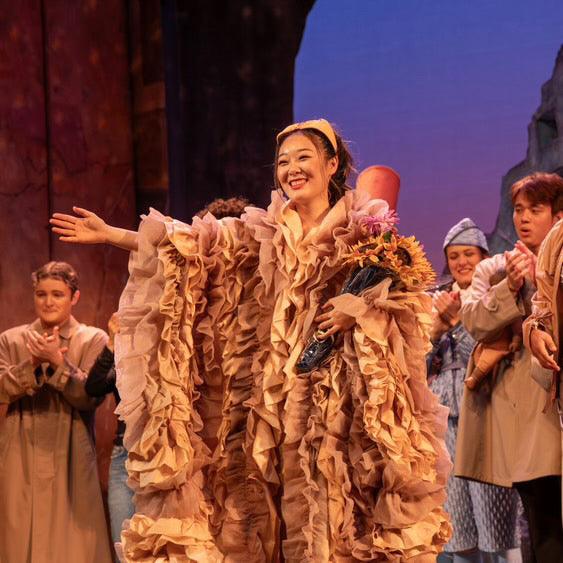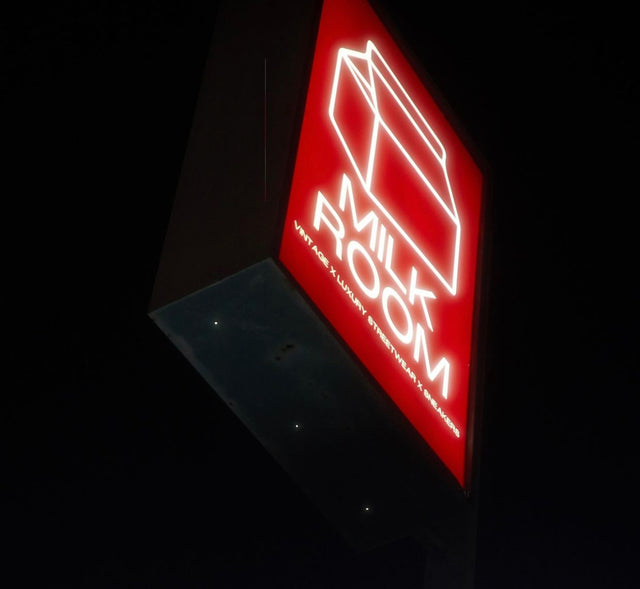Today, we're happy to share with you our conversation with opera singer Habin Kim from Los Angeles, California.
We wanted to get to know a little bit more about who she is, how she got into music and where she's going on her creative journey. Here's how it went:
Thanks for taking the time to chat with us Habin! We're excited to have you as our next feature and learn more about you as a creative. Let's start this off with you sharing exactly what it was that initially drew you to your craft, and how has your journey unfolded since then?
Habin: When I first encountered music, it wasn’t anything grand or magical. At just eight years old, I tagged along with a friend who dragged me to a children's chorus because she didn’t want to go alone. That’s how it all began. I was the type of kid who couldn’t stick with anything for more than three months before losing interest. Yet, despite competitions ending in tears or getting scolded by my teacher, I kept singing. Looking back, I realize I must have secretly loved it all along. During my middle school years, I moved to the U.S. alone and spent two years in a homestay, grappling with my identity. I had to quit singing to focus on academics, but I couldn’t shake the pull of music as I watched my middle school choir perform. Despite my academic commitments, I found myself yearning to reconnect with that part of myself, sensing that music would always be a part of my journey. High school was when I reignited my passion for singing. Fortunately, I found a voice teacher nearby who helped me rediscover my love for music. Under her guidance, my enthusiasm grew, leading me to choose singing as my major for university. Of course, covid hits and I wasn’t able to sing much for a year and a half. After the isolation of the pandemic, I finally had the chance to perform on stage with someone else, and the thrill of improvising as a character was unlike anything I had experienced before; it filled me with a rush of joy and clarity. At that moment, I knew this was what I wanted to do for the rest of my life. This year, however, I found myself on the brink of quitting singing. My voice felt stagnant, and I was stuck in a rut. I realized that progress often comes in steps rather than a straight line. Then, just when I thought I’d hit a dead end, my voice suddenly began to move again. Few months later, I received an offer from Long Beach Opera, pulling me out of that black hole of uncertainty and reigniting my passion for music. I’m just beginning my music career, and there’s so much more to unfold from here! Each new opportunity is a chance to learn, grow, and express myself in ways I’ve yet to explore. I’m excited to see where this journey takes me, embracing the challenges and triumphs along the way.
Can you share some insights into your creative process? Where do you find inspiration, and how do you translate that into your work?
Habin: Being in the field of Opera requires me to seek multiple sources of inspiration as an artist and fine arts have always been a profound source of inspiration for me as an artist. I constantly seek diverse avenues for inspiration through visiting museums and art galleries with exquisite collections from around the world. When exploring fine arts, I notice that different genres and eras evoke distinct emotions and perspectives within me. Old paintings from the 1500s to 1800s, for instance, captivate my imagination and provide insights into the cultural and societal contexts of the specific time periods. Impressionist and post-impressionist paintings, on the other hand, resonate with me on a deeply emotional level. The vibrant colors, bold brushstrokes, and innovative techniques employed by artists such as Monet and Degas ignite a flame within me. Contemporary art connects with me on a personal and introspective level. It challenges my old ideas and pushes me to show my raw, unrefined identity and thoughts. And all of these new ideas are applied to staging, character development, and performance. When I was staging Dido and Aneas, I visited Houston Fine Arts Museum and stumbled upon a piece titled, “The Royal Hunt of Dido and Aeneas,” by Francesco Solimena which became a significant visual reference to the scene where I sing “Haste, haste to town” as the character Belinda. Additionally, artists like Rothko, Joan Mirò, and Mark Chagall always encourage me to explore boundaries of my own creativity.
What projects are you currently working on, and what excites you the most about them?
Habin: I’m excited to be involved in a few upcoming projects! One of the most anticipated is "Mad Girls Love Song", an installation created by my collaborator and dear friend, McCall Cadenas. This immersive piece invites the audience to explore the fragmented layers of self, love, and memory in a surreal, intimate setting. The installation transforms the space into a woman’s room—a symbolic representation of her inner mind, where thoughts and emotions come alive. I’ll be performing as one of the two leads in this work, which debuts on November 9th at Cuarto Central. Another production I’m thrilled to be part of is Handel’s early opera “Rodrigo”, directed by my dear friend and mentor, James Darrah, and conducted by Christopher Rountree with a full baroque orchestra. It will take place next year on May 16th, 17th, and 18th at The Little Theater in Macgowan Hall at UCLA. Lastly, I am very thrilled to collaborate with my fellow bassist Marlon Martinez to perform a small recital featuring bass and soprano voice which is the lowest and the highest instrument. It will be very interesting and exciting! The location and time are yet to be determined.
Looking back on your career so far, what would you consider to be your proudest achievement or most memorable moment?
Habin: Having just graduated with my bachelor's degree, I’m more eager than ever to build my career. This summer of 2024, I had the incredible opportunity to make my debut with Long Beach Opera in "Bye Bye Butterfly", a performance inspired by the works and ideas of Pauline Oliveros. Working alongside so many talented professionals, I experienced tremendous growth as an artist. What I'm most proud of is overcoming the pressure I placed on myself for my debut. As an opera singer, there’s so much to juggle at once—musicality, technique, intonation, acting, and artistry. During rehearsals, I got so caught up in the technical details that I began to lose sight of the joy and artistry that drew me to this work in the first place. But during the performance, I let go, embraced the moment, and found my own freedom in it—something that felt both exhilarating and empowering.
How do you navigate challenges and setbacks in your field, and what advice would you give to aspiring creatives facing similar obstacles?
Habin: Honestly, I’m still facing obstacles. Every time I climb one mountain, I realize it was just a hill, and there are thousands more ahead of me. But that’s part of the journey. You have to throw yourself into the challenge, knowing you might stumble and fall along the way. But those falls teach you how to stand up again, and with the support of those around you, you grow stronger each time.
In an industry constantly evolving, how do you stay innovative and relevant while maintaining your unique voice/style?
Habin: In the rapidly evolving world of the twenty-first century, the definition of a successful musician has shifted dramatically. I believe that success today requires not only mastering traditional art forms but also embracing innovation and exploring modern interpretations of opera that resonate with contemporary audiences. As my mentor, James Darrah—Director of Long Beach Opera and UCLA Opera—once said, “The audience should either hate you or love your interpretation. Being in the middle is boring.” I couldn't agree more. As I continue to grow as an artist, I’ve come to realize that pushing boundaries and putting new ideas out there, without fear of how they’ll be received, is what keeps the art form alive. It’s the raw, unfiltered creativity that drives true innovation.
What do you hope audiences or consumers take away from your work, and what impact do you aspire to make in your industry?
Opera is, I believe, the only art form that can encompass and feature every aspect of artistic expression. As an integrated art, opera combines music, theater, dance, visual arts, and literature, creating a rich tapestry of creativity that captivates audiences. It can bring together a diverse range of voices, ideas, and emotions, allowing for a profound exploration of the human experience.
Lastly, what message or piece of wisdom would you like to share with your fans, or anyone inspired by your journey?
Habin, we thank you again for giving us the chance to get to know more about you. Now, the floor is yours, share with us the links people can use to find more of your work, as well as any special announcements or projects you have coming up in the near future!
Website: Habin Kim
Instagram: Habin (@habin._kim) • Instagram photos and videos













0 Comments
There are no comments yet. Be the first one to post one!